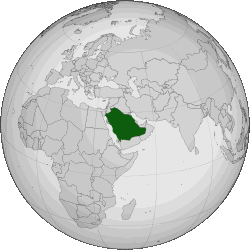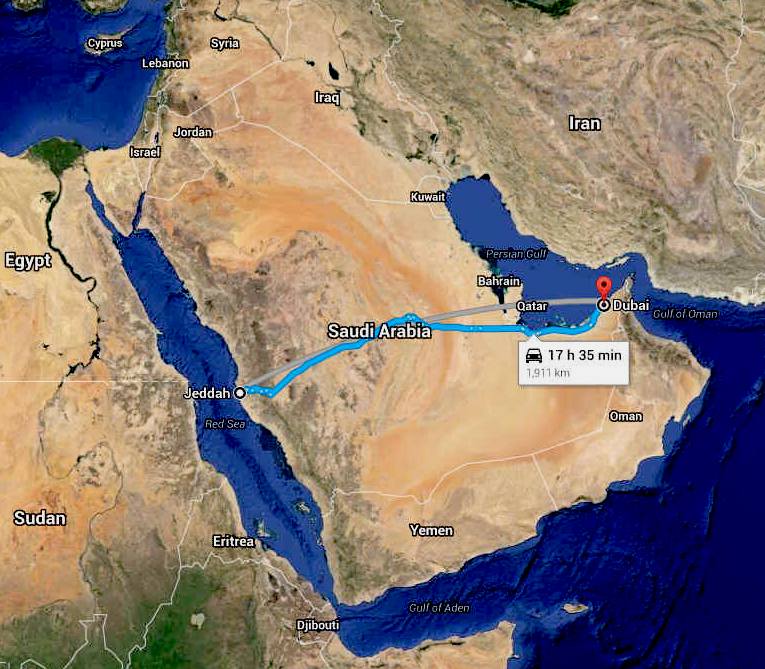CANNONBALL
INTERNATIONAL EV SERIES
The
Cannonball International EV Run™ series is for battery or hydrogen
fuel cell powered
electric vehicles that are based on ordinary production vehicle running
gear and must be capable of carrying at least one passenger. They may be solar
assisted, provided that the solar panel area does not exceed four square
meters - a rule that may be relaxed in subsequent years as we learn from experience. See
the full Cannonball EV rules HERE.
These
rules are designed to promote the development of an international EV infrastructure, as a means of accelerating the transition from
IC
engines to clean electric motors, or other zero emission transportation, especially in countries that do not
have abundant sunshine, where support for non-solar assisted
electric vehicles is all the more important.
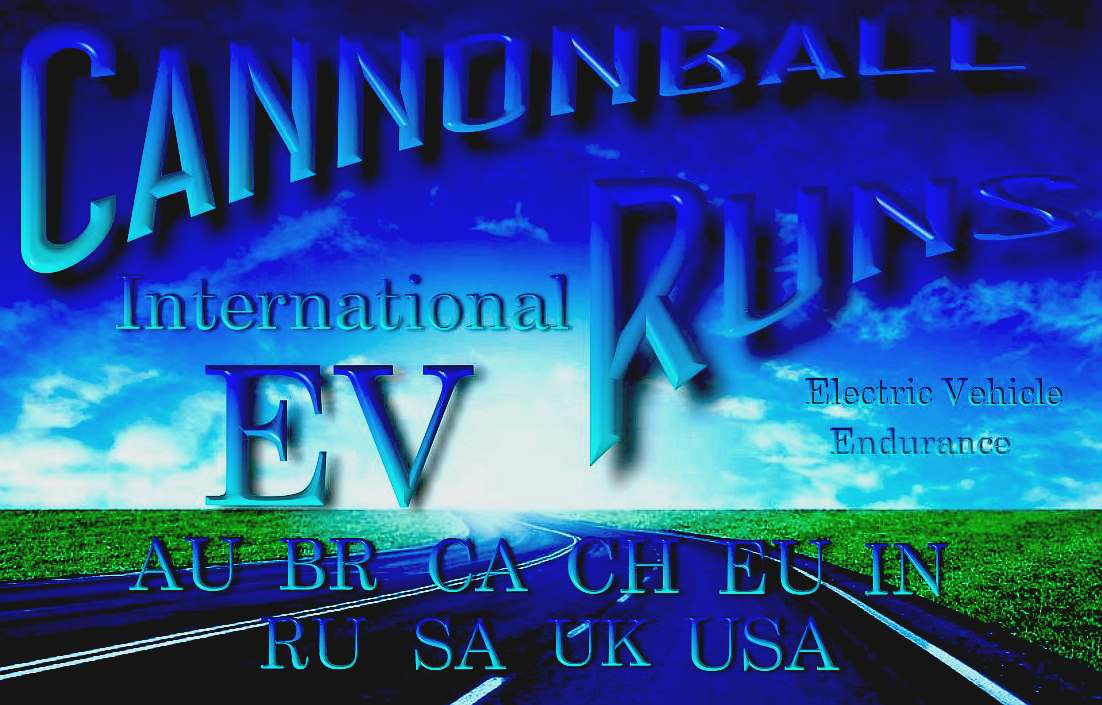

Make
sure that you read the EV runners road rules before entering your
team. Each person completing a recognized run will receive a Blue
Riband eco medal. The competitor with the highest scores overall in
any one year will have their name inscribed on the Bluebird
World Cup.
JEDDAH
to DUBAI : THE ARABIAN DESERT CANNONBALL ZEV RUN STOPS @ 50mph AVE
|
START
|
JEDDAH
|
MILES
RUN
|
LEG
DISTANCE
|
KM
RUN
|
HOURS
|
|
|
|
|
87
|
|
|
|
1st
STOP
|
Mecca
|
54
|
+
|
87
|
1.74
|
|
|
|
|
71
|
|
|
|
2nd
STOP
|
Al
Hada
|
98
|
+
|
158
|
3.16
|
|
|
|
|
41
|
|
|
|
3rd
STOP
|
Al
Huwaya
|
124
|
+
|
199
|
2.48
|
|
|
|
|
260
|
|
|
|
4th
STOP
|
Riyadh
1st leg
|
285
|
+
|
459
|
5.70
|
|
|
|
|
250
|
|
|
|
5th
STOP
|
Riyadh
2nd leg
|
441
|
+
|
709
|
8.82
|
|
|
|
|
267
|
|
|
|
6th
STOP
|
Riyadh
|
606
|
+
|
976
|
12.12
|
|
|
|
|
160
|
|
|
|
7th
STOP
|
Al
Mubarraz 1st leg
|
706
|
+
|
1,136
|
14.12
|
|
|
|
|
173
|
|
|
|
8th
STOP
|
Al
Mubarraz
|
813
|
+
|
1,309
|
16.26
|
|
|
|
|
240
|
|
|
|
9th
STOP
|
Dubai
1st leg
|
963
|
+
|
1,549
|
19.26
|
|
|
|
|
260
|
|
|
|
10th
STOP
|
Dubai
2nd leg
|
1,124
|
+
|
1,809
|
22.48
|
|
|
|
|
234
|
|
|
|
FINISH
|
DUBAI
|
1,270
|
|
2,043
|
25.40
|
GOOGLE
SUGGESTED ROUTE - Driving directions
30 HR target with cartridge exchange and 40 hours with fast charging (This route has tolls).
Please note that there are no fast charging points along this route
that we know of. Hence, bank on 50-60 hours with slow charging. The
Google route planner time of 17 hour 35 minutes, is for an average
speed of 72.6 mph. Clearly, a target speed that is challenging for
many EVs that may be suitable as budget entrant vehicles.
Jeddah
- Saudi Arabia
Take Ibrahim Al Jaffali, Prince Mohammed Bin Abdulaziz St/Route 296 and Umm Al Qura to Route 4050
- 11.9 km / 18 min
Follow Route 4650, Route 40 and Al Kharj Rd/Route 65 to Riyadh Province. Exit from Al Kharj Rd/Route 65
- 999 km / 8 h 42 min
Follow Route 10 to Dubai - Ghweifat International Hwy/E 11 in أبو ظبي، United Arab Emirates
467 km / 4 h 53 min
Follow Dubai - Ghweifat International Hwy/E 11 to Al Marsa St in Dubai. Take exit 29 from E 11
- 431 km / 3 h 44 min
Continue on Al Marsa St to your destination - 1.8 km / 5 min
Continue onto Al Marsa St - 450 m
Turn left onto Al Gharbi St - 750 m
Turn right onto Al Mamsha St/The Walk - 230 m
Take the 1st right onto Al Yolat St - 160 m
Turn right onto Al Sufouh Rd/D 94 - 230 m
Turn right at Jumeirah Beach Rd - 17 m
Dubai
- United Arab Emirates
OFFICIAL
CANNONBALL INTERNATIONAL ZEV ROUTES
|
Arabia
- Jeddah to Dubai
Australia
- Darwin to Adelaide
Brazil
- Boa Vista to Rio de Janeiro
Canada
- Vancouver to Quebec
China
- Ai
Hui
Qu to Shenzen
Denmark
- Skagen to Copenhagen
Egypt
- Kings Valley Rally - Aswan to Alexandria
France
- Calais to Toulon
Germany
- Bremerhaven to Munich
India
- Amritsar to Nagercoil
Italy
- Turin to Reggio Calabria
|
Japan
- Aomori to Kagoshima
Korean
S. Smart City Rally - Seoul to Busan
New
Zealand - Nelson to Invercargill
Nigeria
- Maiduguri to Lagos
Norway
- Bodø to Kristiansand
Russia
- Murmansk to Bolshoy
Sochi
South
Africa - Cape Town to Louis
Trichardt
Spain
- Girona to Huelva
Sweden
- Karlsborg to Gothenburg
UK
- John o'Groats to Lands End (Jogle)
USA
- Los Angeles to New York
|

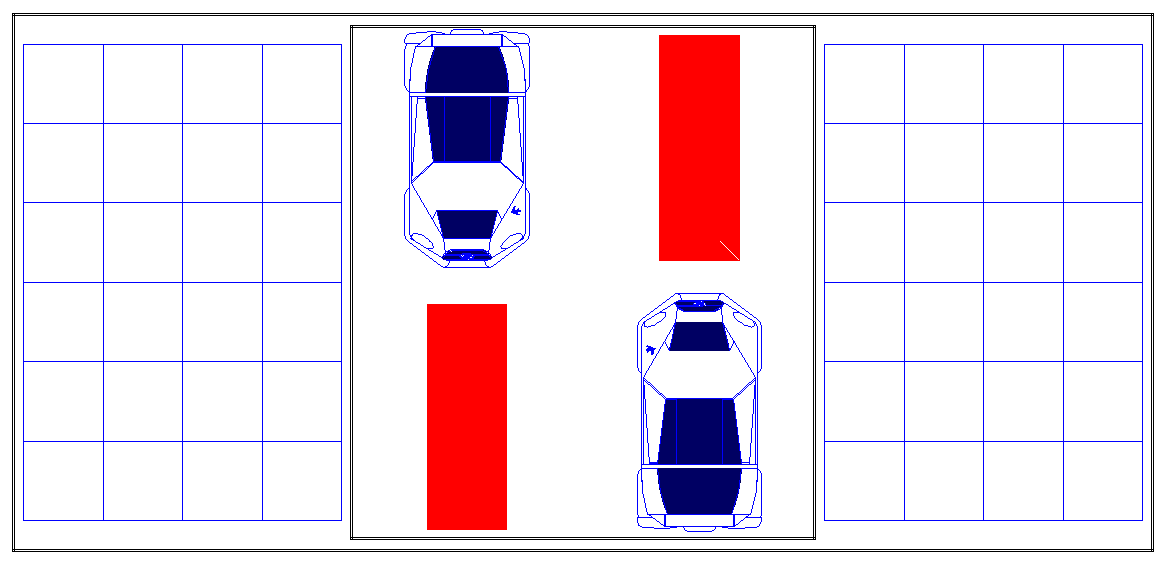
EUROSTATION
CONCEPT: From the plan and end views of the concept
Eurostation for smart cities (above), you may care to agree that the
land, footprint) requirement is significantly smaller than any
conventional petrol/diesel forecourt. The Ecostar
DC50 (currently under construction) is shown here to scale to give
you some idea of size. The DC50 is 300mm longer than a Smart
car and the cartridge shown is actually more suited to the super-minis
and hatchbacks that are so popular today. You do not need to get out of an EV being
serviced, having entering the tunnel. The mechanism is automated. Solar
roofs are advocated by way of harvesting a small percentage of
energy from nature to further offset climate
change. BMS
has an in-house planning consultant with experience of awkward
councils and several victories on appeal to the Secretary of State
under his belt - admittedly, less applicable in Denmark, where their
system is sure to be different.
A
Bluebird™ EuroStation is a 3.6MW solar assisted EV
service facility
containing 60 cartridges on a continuous charge cycle. Five of these
stations (18MW) can recharge (refuel) 10 cars a minute in ideal
circumstances. Next time you
visit your BP
or Tesco
fuel pump, count the number of cars leaving the station in a minute. You
will find that an electric forecourt holds the potential to be quicker.
During rush hour, 600 cars might be serviced in one hour. During an
eight hour day 2,400 or more cars might be serviced - with the equivalent
battery charge cycle of one hour - so even under time pressure, less harmful to batteries than
curbside fast charging and we start every morning with 60 slow charged
cartridges from off-peak overnight supplies. The same forecourt might be used to
service fuel-cell cars powered by liquid hydrogen or hydride pellets. One size fits
all. If 10 Eurostations were to be installed for the same
geographical region, the charge time per exchange rises to 2 hours, and
so on. Further protecting batteries and providing an energy store
buffer. When using fuel cell technology,
charge time does not come into the equation, but other arrangements have
to be made to replenish hydrogen, that at the moment is a long way off - simply because it is unlikely
that we will be engaged to look at that side of things - and without the
flexibility that the Bluebird™ cartridge system offers, EV servicing
is likely to remain a problem.

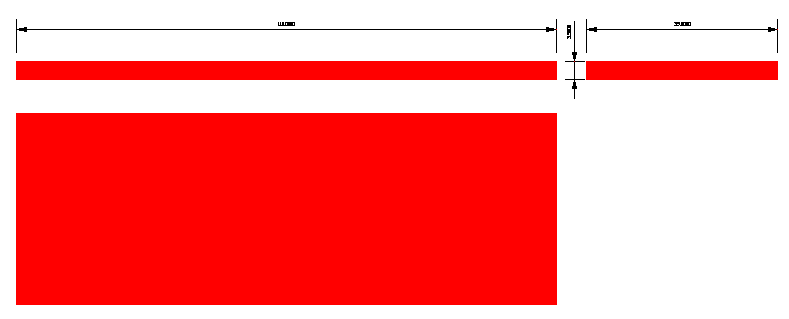
Two
conceptual designs for a Universal energy cartridge, both with 8 cubic feet of
storage capacity. It is not so much the shape
of the cartridge, it is that the loading points are compatible with the car and any
eventual service
station. The pick-up and contact point details are not
shown here due to patent laws prohibiting advance publication. Any shape
cartridge may be suitable for a Bluebird™ service forecourt, provided that
the basic "Universal" connectors are used. We will release these
details one the applicable patent is in the processing
pipeline. Patent application is dependent on identifying a demand. An
unusual situation, but with only twenty years to recover investment, no
sensible IP company (like ourselves) will want to start the clock ticking
too soon. One possible solution to that dilemma, is a binding Agreement with
potential end users - to, in effect overcome patent
law failings.
WORLD
ELECTRIC CAR SALES 2013
|
Electrified
Vehicle Model
|
Total
2013 Sales
|
Dec
Mkt Share
|
2013
Mkt Share
|
|
Nissan
Leaf
|
47484
|
17%
|
23%
|
|
Chevy
Volt
|
28252
|
11%
|
14%
|
|
Toyota
Prius PHEV
|
23075
|
6%
|
11%
|
|
Tesla
Model S*
|
22186
|
10%
|
11%
|
|
Mitsubishi
Outlander PHEV
|
18444
|
24%
|
9%
|
|
Renault
Zoe
|
8869
|
2%
|
4%
|
|
Volvo
V60 PHEV
|
7437
|
7%
|
4%
|
|
Ford
C-Max Energi
|
7353
|
3%
|
4%
|
|
Ford
Fusion Energi
|
6206
|
3%
|
3%
|
|
Renault
Kangoo ZE
|
5886
|
2%
|
3%
|
|
Chery
QQ3 EV*
|
5007
|
1%
|
2%
|
|
Mitsubishi
i
|
4769
|
1%
|
2%
|
|
Smart
Fortwo ED
|
4130
|
2%
|
2%
|
|
Opel
Ampera
|
3157
|
3%
|
2%
|
|
Renault
Twizy
|
3062
|
1%
|
1%
|
|
Jac J3
EV*
|
2500
|
1%
|
1%
|
|
Ford
Focus Electric
|
1894
|
1%
|
1%
|
|
BYD e6
|
1684
|
1%
|
1%
|
|
VW
e-Up!
|
1465
|
3%
|
1%
|
|
Mitsubishi
Minicab MiEV
|
1464
|
0%
|
1%
|
|
BMW i3
|
1318
|
2%
|
1%
|
ARABIAN
TRANSPORT
The UAE has been spending billions of dollars on infrastructure. These developments are particularly evident in the larger emirates of Abu Dhabi and Dubai. The northern emirates are rapidly following suit, providing major incentives for developers of residential and commercial property.
Dubai International Airport was the Busiest airport in the world by international passenger traffic from January to May 2013, overtaking London Heathrow. As roads in the western and southern regions are still relatively undeveloped, residents prevalently use airplanes as the main or alternative mode of transportation. A 1,200 km (750 mi) country-wide national railway is under construction which will connect all the major cities and ports. The Dubai Metro is the first urban train network in the Arabian Peninsula. The major ports of the United Arab Emirates are Khalifa Port, Zayed Port, Port Jebel Ali, Port Rashid, Port Khalid, Port Saeed, and Port Khor Fakkan.
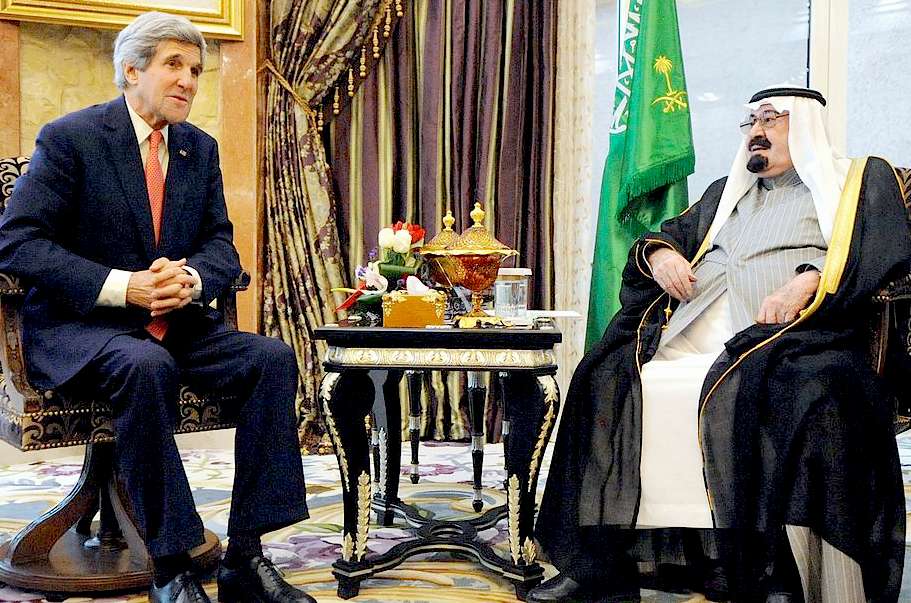
Abdullah ibn Abdilazīz (Arabic: عَبدُٱللهِ ٱبنُ عبدِ العزيزِ ʻAbdullāh ibnu ʻAbdilʻAzīz, born 1 August 1924) is the King of Saudi Arabia. He ascended to the throne on 1 August 2005 upon the death of his half-brother, King
Fahd. According to Forbes, Abdullah is among the world's most powerful people ranked 8th globally.
Abdullah, like Fahd, is one of the many sons of Ibn Saud, the founder of modern Saudi Arabia. Abdullah has held important political posts throughout most of his adult life. In 1961 he became mayor of Mecca, his first public office. In 1962, he was appointed commander of the Saudi Arabian National Guard, a post he was still holding when he became king. He also served as deputy defense minister and was named crown prince when Fahd took the throne in 1982.
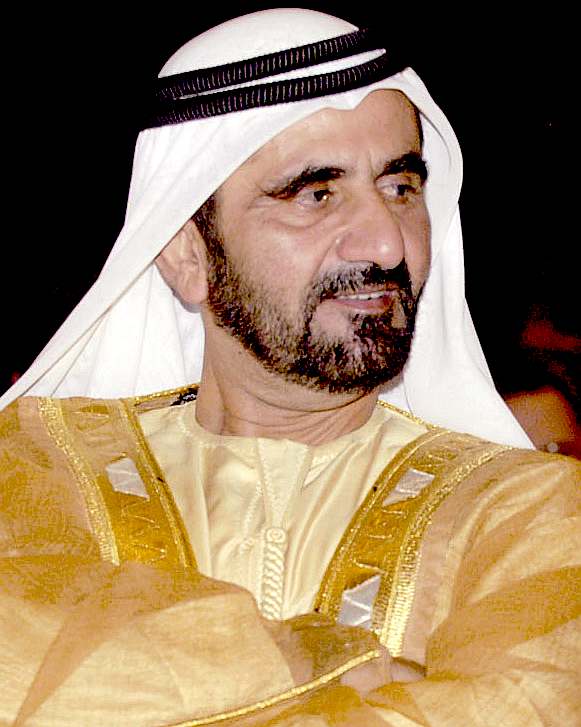
Mohammed bin Rashid Al Maktoum (Arabic محمد بن راشد آل مكتوم; Muḥammad bin Rāshid al Maktūm), also Sheikh Mohammed, (born 15 July 1949) is the Vice President and Prime Minister of the United Arab Emirates (UAE), and constitutional monarch of Dubai.
Since his accession in 2006, he has undertaken major reforms in the UAE's government, starting with the UAE Federal Government Strategy in April 2007. In 2010 he launched UAE Vision 2021 with the aim of making the UAE "One of the best countries in the world" by 2021.
He is responsible for Dubai's growth into a global city, as well as the launch of a number of major enterprises including Emirates Airline, DP World and the Jumeirah Group. Many of these are held by Dubai Holding, the holding company with multi-diversified businesses and investments. He currently owns 99.67% of the company.
Sheikh Mohammed has overseen the development of numerous economically transformational projects in Dubai including the creation of technology park and free economic zone Dubai Internet City, Dubai Media City, the Dubai International Finance Centre the Palm Islands and the iconic Burj Al Arab hotel. He also drove the construction of the Burj Khalifa, the tallest building in the world.
THE
ARABIAN ECONOMY
SAUDI
ARABIA - Saudi Arabia's command economy is petroleum-based; roughly 75% of budget revenues and 90% of export earnings come from the oil industry.
Saudi Arabia is thus dangerously dependent on oil. It is also strongly dependent on foreign workers with about 80% of those employed in the private sector being non-Saudi. Among the challenges to
the Saudi economy include halting or reversing the decline in per capita income, improving
education to prepare youth for the workforce and providing them with employment, diversifying the economy, stimulating the private sector and housing construction, diminishing corruption and inequality.
We
think you may agree that this is no mean feat and will require
considerable management skills and more than likely, social
innovation.
The oil industry comprises about 45% of Saudi Arabia's nominal gross domestic product, compared with 40% from the private sector. Saudi Arabia officially has about 260 billion barrels (4.1×1010 m3) of oil reserves, comprising about one-fifth of the world's proven total petroleum reserves.
That is all very well, but other countries around the world are
developing their renewable energy industries. The effect of which is
that oil will no longer be required. Hence, the country will be
sitting on fossil reserves that nobody wants anymore. Especially, with
shipping making the move to less polluting fuels because of MARPOL.
This is an irreversible trend where Europe and now America and China
are pushing the zero carbon economies. In other words sustainability.
Burning coal and
oil, no matter how cheap, is considered to be un-sustainable.
|

|
CLEAN
RENEWABLE
ENERGY TO
REPLACE
DIRTY FOSSIL FUELS |
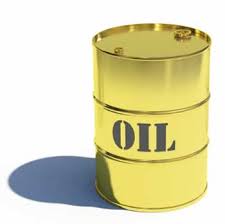
|
In the 1990s, Saudi Arabia experienced a significant contraction of oil revenues combined with a high rate of population growth. Per capita income fell from a high of $11,700 at the height of the oil boom in 1981 to $6,300 in
1998. Increases in oil prices since 2000 have helped boost per capita GDP to $17,000 in 2007 dollars, or about $7,400 adjusted for inflation. Taking into account the impact of the real
oil price changes on the Kingdom's real gross domestic income, the real command-basis GDP was computed to be 330.381 billion 1999 USD in 2010. Oil price increases of 2008–2009
triggered a second oil boom.
The
glut of oil in 2014 is bound to upset the Arabian economy. A move to
electric cars and solar assisted power for transport, based on
strategic infrastructure developments, will have the effect of
boosting the economy and preserve oil for export income.
Saudi Arabia plans to launch six "economic cities" (e.g. King Abdullah Economic City), to be completed by 2020, in an effort to diversify the economy and provide jobs. The King has announced that the per capita income is forecast to rise from $15,000 in 2006 to $33,500 in 2020. The cities will be spread around Saudi Arabia to promote diversification for each region and their economy, and the cities are projected to contribute $150 billion to the GDP.
To further enhance such plans, integrated smart city transport
planning will be beneficial, or rather is essential to future proof an
economy that at present relies on oil.
UNITED
ARAB EMIRATES - The UAE has the second largest economy in the Arab world (after Saudi Arabia), with a gross domestic product (GDP) of $377 billion (AED1.38 trillion) in 2012. Since independence in 1971, UAE's economy has grown by nearly 231 times to AED1.45 trillion in 2013.The non-oil trade has grown to AED1.2 trillion, a growth by around 28 times from 1981 to 2012.
In 2011, UAE is ranked as the 14th best nation in the world for doing business based on its economy and regulatory environment, ranked by the Doing Business 2011 Report published by the World Bank Group.
Petroleum and natural gas exports play an important role in the economy, especially in Abu Dhabi. More than 85% of the UAE's economy was based on the exports of natural resources in 2009. The UAE has tried to reduce its dependency on oil exports by diversifying the economy, particularly in the financial, tourism and construction sectors. While Abu Dhabi remained relatively conservative in its approach, Dubai, which has far smaller oil reserves, was bolder in its diversification policy.
The GDP growth rate for 2010 was 3.20%. Consumer price index inflation in the April 2008 — April 2009 year was 1.9%. The national debt as of June 2009 was $142 billion. In 2009, its GDP, as measured by purchasing power parity, stood at US$ 400.4 billion. With a population of just under 900,000 Abu Dhabi was labeled "The richest city in the world" by a
CNN article.
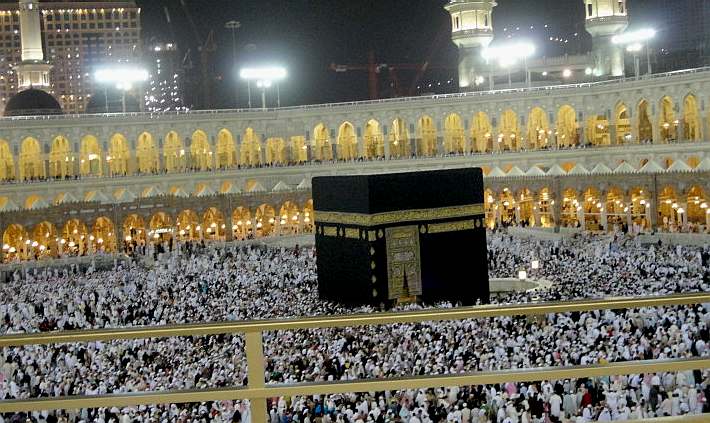
MECCA
Mecca (/ˈmɛkə/; Arabic: مكة, Makkah, pronounced [ˈmæk.kæ]), also transliterated as Makkah, is a city in the Hejaz and the capital of Makkah Province in Saudi Arabia. The city is located 70 km (43 mi) inland from Jeddah in a narrow valley at a height of 277 m (909 ft) above sea level. Its resident population in 2012 was roughly 2 million, although visitors more than triple this number every year during Hajj period held in the twelfth Muslim lunar month of Dhu al-Hijjah.
As the birthplace of Muhammad and the site of Muhammad's first revelation of the Quran (specifically, a cave 3 km (2 mi) from Mecca), Mecca is regarded as the holiest city in the religion of Islam and a pilgrimage to it known as the Hajj is obligatory for all able Muslims. Mecca is home to the Kaaba, by majority description Islam's holiest site, as well as being the direction of Muslim prayer. Mecca was long ruled by Muhammad's descendants, the sharifs, acting either as independent rulers or as vassals to larger polities. It was absorbed into Saudi Arabia in 1925. In its modern period, Mecca has seen tremendous expansion in size and infrastructure, home to structures such as the Abraj Al Bait, also known as the Makkah Royal Clock Tower Hotel, the world's third tallest building and the building with the largest amount of floor area. During this expansion, Mecca has lost some historical structures and archaeological sites, such as the Ajyad Fortress. Today, more than 15 million Muslims visit Mecca annually, including several million during the few days of the Hajj. As a result, Mecca has become one of the most cosmopolitan and diverse cities in the Muslim world, despite the fact that non-Muslims are prohibited from entering the city.
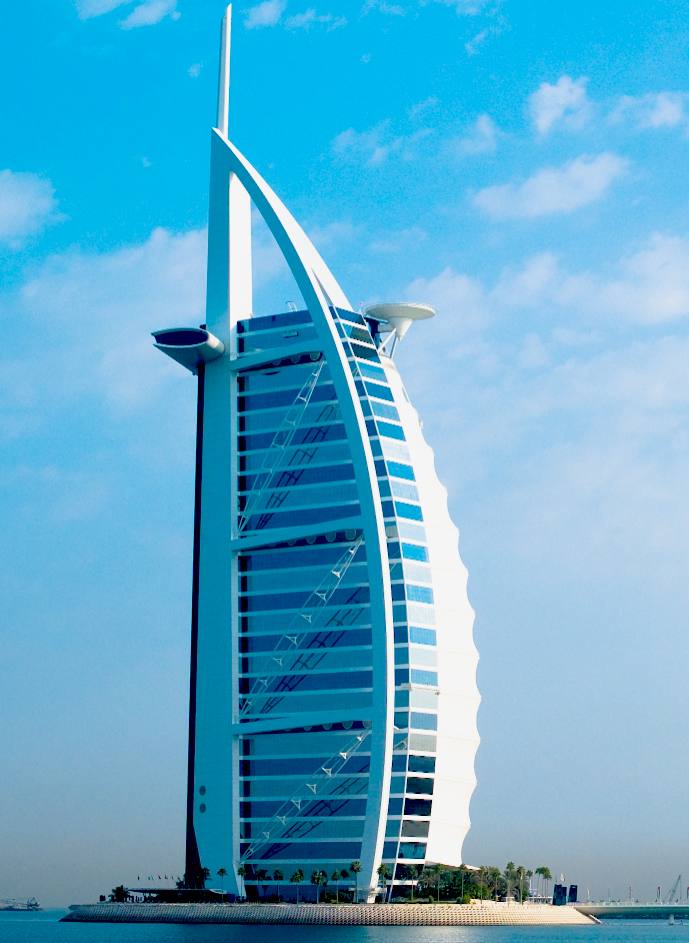
DUBAI
Dubai (/duːˈbaɪ/ doo-BY; Arabic: دبيّ Dubayy, IPA: [dʊˈbæj]) is the most populous city and emirate in the
United Arab Emirates (UAE), and the second largest emirate by territorial size after the capital, Abu Dhabi.
Dubai is located on the southeast coast of the Persian Gulf and is one of the seven emirates that make up the country. Abu Dhabi and Dubai are the only two emirates to have veto power over critical matters of national importance in the country's legislature. The city of Dubai is located on the emirate's northern coastline and heads up the Dubai-Sharjah-Ajman metropolitan area. Dubai recently won the bid for the World Expo 2020.
Today, Dubai has emerged as a global city and business hub of the Persian Gulf region. It is also a major transport hub for passengers and cargo. By the 1960s Dubai's economy was based on revenues from trade and, to a smaller extent, oil exploration concessions, but oil wasn't discovered until 1966. Oil revenue first started to flow in 1969. Dubai's oil revenue helped accelerate the early development of the city, but its reserves are limited and production levels are low: today, less than 5% of the emirates' revenue comes from oil. The emirate's Western-style model of business drives its economy with the main revenues now coming from tourism, aviation, real estate, and financial services. Dubai has recently attracted world attention through many innovative large construction projects and sports events. The city has become symbolic for its skyscrapers and high-rise buildings, in particular the world's tallest building, the Burj Khalifa. Dubai has been
criticized for human rights violations concerning the city's largely South Asian workforce. Dubai's property market experienced a major deterioration in 2008–2009 following the financial crisis of 2007-2008, but is making a gradual recovery with help from
neighboring emirates.
As of 2012, Dubai is the 22nd most expensive city in the world and the most expensive city in the Middle East. In 2014, Dubai's hotel rooms were rated as the second most expensive in the world, after Geneva. Dubai was rated as one of the best places to live in the Middle East by American global consulting firm Mercer.
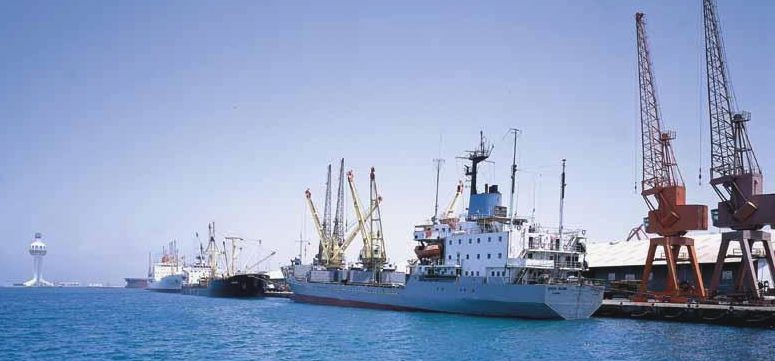
JEDDAH
Jeddah (sometimes spelled Jiddah or Jedda ; English pronunciation: /ˈdʒɛdə/; Arabic: جدة Jiddah or Jaddah, IPA: [ˈdʒɪddæ, ˈdʒæddæ]) is a city in the Hijaz Tihamah region on the coast of the Red Sea and is the major urban center of western Saudi Arabia. It is the largest city in Makkah Province, the largest sea port on the Red Sea, and the second-largest city in Saudi Arabia after the capital city, Riyadh. With a population currently at 5.1 million, Jeddah is an important commercial hub in Saudi Arabia. It was devastated by floods in early 2011.
Jeddah is the principal gateway to Mecca, Islam's holiest city, which able-bodied Muslims are required to visit at least once in their lifetime. It is also a gateway to Medina, the second holiest place in Islam.
Economically, Jeddah is focusing on further developing capital investment in scientific and engineering leadership within Saudi Arabia, and the Middle
East. Jeddah was independently ranked fourth in the Africa – Mid-East region in terms of innovation in 2009 in the Innovation Cities Index.
Jeddah is one of Saudi Arabia's primary resort cities and was named a Gamma world city by the Globalization and World Cities Study Group and Network (GaWC).
Historically, Jeddah has been well known for its legendary money changers. The largest of said money changers at the time (the late Sheikh Salem Bin Mahfouz) eventually founded Saudi Arabia's first bank, the National Commercial Bank
(NCB).
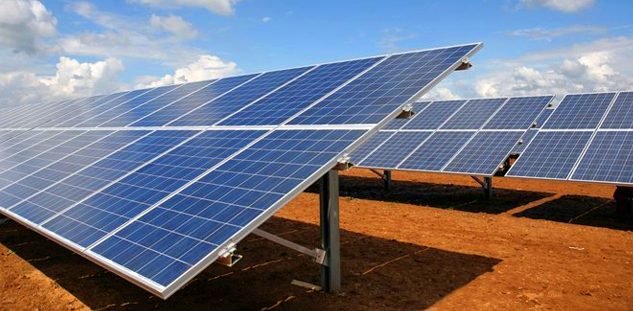
21
AUG 2014 - DUBAI'S 10 YEAR PLAN FOR 'SMART' ENERGY and TRANSPORT
SYSTEMS
A 10-year plan to upgrade Dubai’s utilities’ infrastructure and launch new initiatives to promote the use of
electric vehicles to reduce pollution has been announced by the Dubai Electricity and Water Authority
(DEWA).
DEWA is quoted as saying that it aimed to boost its generating and distribution capacity, increase the use of advanced ‘smart’ technologies and introduce a network of electric vehicle charging stations to boost the use of electric vehicles and help cut environmental pollution.
DEWA said the plan is in addition to annual upgrades of the region’s transmission and distribution systems.
Three key initiatives are included in the plan, DEWA said. The first initiative will be to encourage more home and building owners to install solar panels for domestic use and export surplus electricity back to the grid.
The installation of smart meters forms part of the second initiative.
DEWA said increased use of smart meters will help consumers monitor their energy use more effectively while promoting energy conservation and efficiency. Advanced technology including fibre optic cables will be used to transmit usage data and other information to help
DEWA optimise services.
DEWA said it has installed 70,000 smart meters to date and a further 200,000 meters are set to be installed in the next phase.
Promoting the use of electric vehicles is the third initiative outlined in
DEWA’s plan. DEWA said it is working with the transport sector including car manufacturers, airports, shopping malls, petrol stations and local transport authorities.
DEWA said it plans to cooperate with the Dubai Municipality and local industry to install 100 charging stations “in various areas of Dubai”, such as malls, airports, commercial buildings, over a one-year period.
DEWA’s chief executive officer and managing director Saeed Mohammed Al Tayer said:
“We seek to achieve that by focusing our efforts on setting up an excellent energy infrastructure that meets the Emirate’s development needs.”
Al Tayer said the hosting of the Expo 2020 Dubai world fair was acting as a catalyst for a wide range of infrastructure projects. He said the event “will be a unique opportunity for us to show the world our excellence in the public utilities and infrastructure sectors... and to help make our country a leading international economic hub.”
Expo 2020 Dubai is expected to attract 25 million visitors, 70% of whom will be from overseas. Innovation in transport, logistics and development of renewable energy are key themes of the event.
According to a Middle East survey published in June 2014 by professional services firm PwC (28-page / 1.25 MB PDF), 75% of respondents expected an increase in spending over the next 12 months, “largely driven by mega events” as well as increased spending on social infrastructure.
The International Monetary Fund said in June that the UAE’s economic growth is expected to be 4.8% in 2014 and about 4.5% in coming years, supported by “megaprojects” such as the successful bid for Expo 2020.
SOLAR
COLA ARABIA LTD
This
page is sponsored by Solar Cola
Arabia Limited (SCA). SCA is committed
to providing healthier soft drinks using fair trading principles. SCA are
supporters of the Cannonball Trans-Nigeria Run and give a generous
percentage of profits to environmental projects that promote sustainable
principles, locally and internationally - for a better, cleaner planet.
Solar Cola hopes that this Trans-Arabian desert rally will encourage local
talent to get involved in transportation. Foreign entrants may also help
identify problem areas, and by completing this desert course may prove the
viability of a EuroStation type of energy network.

LINKS
& REFERENCE:
Wikipedia
Dubai
Wikipedia
Mecca
Wikipedia
Jeddah
Wikipedia
United_Arab_Emirates
Wikipedia
Saudi_Arabia
Michelin
Challenge Bibendum
Out
Law infrastructure plan sets Dubai on course for smart energy and
transport systems
http://www.dewa.gov.ae/
http://en.wikipedia.org/wiki/Dubai
http://en.wikipedia.org/wiki/Mecca
http://en.wikipedia.org/wiki/Jeddah
http://en.wikipedia.org/wiki/United_Arab_Emirates
http://en.wikipedia.org/wiki/Saudi_Arabia
http://evworld.com/news.cfm?newsid=29419
http://www.challengebibendum.com/
http://www.challengebibendum.com/eng/Our-approach/our-mission
http://stateofgreen.com/en
http://irena.org/
http://www.imf.org/
http://www.ebrd.com/
http://www.ducc.co.uk
http://www.forbes.com
2014 oil-majors-woes-good-news-for-tesla-and-other-ev-makers
http://metro.co.uk
2011 cannonball run remake attracts bids from rival guy ritchie and
shawn levy
http://en.wikipedia.org/wiki/The_Cannonball_Run
mile-to-km.com/km-to-miles
New
York Times
2014/11/11 Denmark-aims-for-100-percent-renewable-energy
http://www.mile-to-km.com/km-to-miles.php
http://www.worldsolarchallenge.org/
http://www.endtoenders.co.uk/
https://maps.google.com/
http://www.rideacrossbritain.com/packages/end-to-end/
